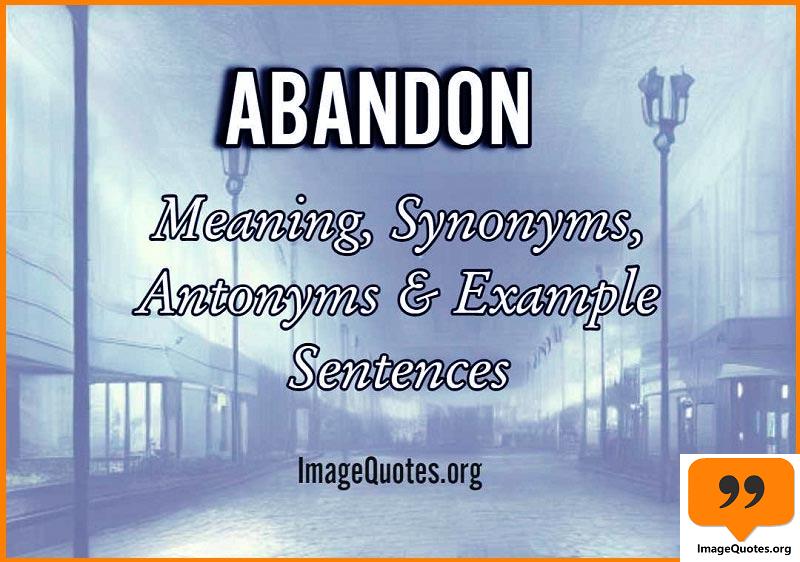In this comprehensive article, we will explore ABANDON meaning, synonyms, antonyms, and example sentences in English. Abandon is a versatile word that can convey various shades of emotion and action. Whether you are a language enthusiast or simply curious about expanding your vocabulary, this article will provide you with a thorough understanding of this word. So, let’s dive in and uncover the intricacies of “abandon”!
Abandon Meaning in English
Abandon is a dynamic verb that encompasses a range of concepts. It generally refers to the act of leaving something or someone behind, often indicating a sense of recklessness or lack of restraint. When used in different contexts, “abandon” can convey various shades of meaning, such as surrender, desertion, or even intense passion.
Other forms: abandons, abandoning, abandoned.
Other Words from Abandon
- a·ban·don·a·ble (adjective)
- un·a·ban·don·ing (adjective)
- a·ban·don·er (noun)
- a·ban·don·ment (noun)
Synonyms of Abandon
- Recklessness: An audacious and impulsive quality that disregards consequences.
- Forsake: To abandon or desert someone or something.
- Relinquish: To let go or surrender control.
- Ditch: To leave behind abruptly or without warning.
- Discard: To get rid of or cast aside.
- Renounce: To formally give up or reject.
- Unleash: To set free or release.
- Waive: To voluntarily relinquish or forgo.
- Dump: To abandon or discard carelessly.
- Surrender: To yield or give up control.
Antonyms of Abandon
- Retain: To keep or hold on to.
- Clasp: To hold tightly or embrace.
- Maintain: To preserve or sustain.
- Repress: To restrain or suppress.
- Cultivate: To nurture or develop.
- Guard: To protect or defend.
- Secure: To ensure or make it safe.
- Uphold: To support or maintain.
- Restrain: To hold back or control.
- Reclaim: To recover or retrieve.

How To Use Abandon In A Sentence
To better understand how “abandon” is used in context, let’s explore some example sentences:
- She danced with wild abandon, losing herself in the music’s rhythm.
- After years of neglect, the old building was left to decay and was eventually abandoned.
- The adventurer decided to abandon the difficult trek due to adverse weather conditions.
- Despite the challenges, she refused to abandon her dreams and persevered.
- The parents had no choice but to abandon their search for their lost child as night fell.
- He abandoned his unhealthy habits and embraced a healthier lifestyle.
- The coach urged the team to abandon their cautious approach and play with more aggression.
- The author’s captivating writing style can transport readers and make them abandon reality for a while.
- In the face of danger, he chose to abandon his fears and confront the situation head-on.
- The shipwrecked sailors were forced to abandon their vessels and swim to shore.
Video Explaining Meanings of Abandon
Frequently Asked Questions (FAQs)
Q: What does abandon mean?
A: Abandon meaning: To leave something or someone behind, often with a sense of recklessness or lack of restraint.
Q: How do you spell abandon?
Q: Can abandonment also imply surrendering or giving up?
A: Yes, “abandon” can indeed convey the idea of surrendering or giving up, especially in certain contexts or situations.
Q: What is the meaning of abandoned with examples?
A: Left behind or deserted: When something or someone is abandoned, it means they have been left behind or deserted, often with no intention of returning or providing care. For example (abandoned in sentences):
- “The abandoned house at the end of the street was in a state of disrepair.”
- “The puppy was found abandoned on the roadside.”
Q: How can abandoned be used in example sentences?
A: Here are some example sentences that illustrate the usage of “abandon”:
- She danced with wild abandon, losing herself in the music’s rhythm.
- After years of neglect, the old building was left to decay and was eventually abandoned.
- The adventurer decided to abandon the difficult trek due to adverse weather conditions.
- Despite the challenges, she refused to abandon her dreams and persevered.
- The parents had no choice but to abandon their search for their lost child as night fell.
Q: Is abandon a versatile word?
A: Yes, “abandon” is a versatile word that can convey various shades of emotion and action, such as surrender, desertion, or even intense passion.
Explore Meaning of Abandon in Britannica Dictionary
Conclusion
In conclusion, the word abandon carries a diverse range of meanings and can be used to express various emotions and actions. Whether it signifies leaving something behind recklessly, surrendering, or even passionately embracing a situation, “abandon” is a word that adds depth and intensity to the English language.
By understanding Abandon Meaning, synonyms, antonyms, and abandon & abandoned in example sentences, we can grasp the nuances of this dynamic term. So go ahead and incorporate abandon into your vocabulary to convey a wide array of sentiments and ideas.
